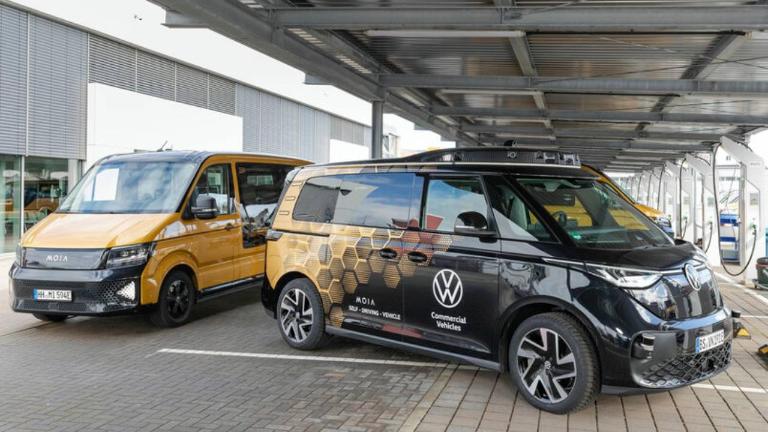Volkswagen Group joins the autonomous ridepooling project in Europe
The pilot project, in which the Volkswagen Group is participating with MOIA and the ID.BUZZ AD, will be on the roads in 2025. The goal is to have up to 10,000 self-driving shuttles in Hamburg by 2030, providing a modern transport service on demand.
Hamburg is undoubtedly a pioneering city in terms of transport. It is now focusing on autonomous driving and is preparing to integrate self-driving shuttles into the urban network, thanks to an agreement between the German Federal Ministry of Transport and the local municipality. The aim is to have up to 10,000 autonomous shuttles by 2030, to take the on-demand transport service already operating to a new level to supplement the classic bus and train services, offering city travellers a viable alternative to private cars.
The pilot project is called ALIKE and will test autonomous shuttles (autonomous driving level 4 – highly automated driving): they can be booked through the dedicated app, pick up passengers and take them to their destination. The service will meet stringent safety requirements and is designed to be scalable in different regions and also used in rural areas. With this in mind, the pilot project will also serve to assess the social acceptance of autonomous driving services.
The ALIKE project
The ALIKE project is funded by the German Federal Ministry for Digital and Transport, with an investment of 26 million euros in a consortium bringing together six partners: project leader is HOCHBAHN, a public transport company, then for the automotive sector MOIA, the Volkswagen Group's mobility-on-demand company, and manufacturers of autonomous driving vehicles HOLON and Volkswagen Commercial Vehicles. They are joined by the Karlsruhe Institute of Technology (KIT) as a research partner and the Hamburg Transport and Mobility Development Authority (BVM). "Autonomous driving can reduce traffic congestion in large cities, while at the same time ensuring tailor-made and digital mobility, which also brings users to their destinations with shared routes in a cost-saving way," commented Volker Wissing, Federal Minister for Digital and Transport.
The role of MOIA
Anjes Tjarks, Hamburg's City Senator for Transport and Mobility Transition, has the same opinion: 'Autonomous ridepooling bridges the gap between traditional public transport and individual mobility needs. It is the evolution of public transport and an attractive alternative to private cars'.
In the first stage of the project, up to 20 self-driving vehicles will be used, integrated into an on-demand service that can be booked via app. MOIA, specifically, will provide the IT platform to manage the operations, including the software that controls the ridepooling, providing its expertise in this area: since 2019, in fact, MOIA has been operating in Hamburg the largest 100% electric (with drivers) ridepooling service in Europe. HOCHBAHN, on the other hand, has already been responsible for a project in the past years in which an autonomous shuttle operated in Hamburg for the first time.
Public and private
The ALIKE project will start with two electric and self-driving shuttle models: one is supplied by HOLON and debuted at the last CES in Las Vegas; it transports up to 15 passengers safely, has a maximum speed of 60 km/h and is also suitable for users with disabilities thanks to its automated ramp, wheelchair protected area and acoustic and visual assistance for passengers. The other vehicle used as a shuttle will be the Volkswagen ID. Buzz AD, which has already successfully completed initial tests on public roads and will be the Volkswagen Group's first self-driving production vehicle.
Volkswagen ID. Buzz AD
"The ID. Buzz AD is equipped with cutting-edge technology, uses the Mobileye self-driving system and is perfectly sized for the city. It has cameras, radar and lidar, and high-performance computers. The software is capable of 360° environmental recognition that is superior to human perception”, explains Christian Senger, Member of the Board of Management of Volkswagen Commercial Vehicles for Autonomous Driving Development.
The Karlsruhe Institute of Technology will provide scientific support by dealing with all aspects of mobility, from social planning to technical developments in transport. The aim is to take an interdisciplinary approach to organise traffic efficiently and sustainably, observing the effects of new mobility services on users and ensuring the integration of systems. Within the scope of the project, the social acceptance of autonomous driving in public transport will be studied in particular and user behaviour models will be derived.
Towards 2025
The ALIKE project was initiated with funding from the Federal Ministry of Transport; in the coming weeks, the processes to be implemented will be defined on the basis of the preliminary work of the consortium partners. It will last three years and will be divided into three main phases: the first preparatory phase, which includes detailed planning and software development. The second is the integration phase, in which the vehicles will be connected to the operational software and authorisations will be required for both the vehicles themselves and the operational area. The third, and last, will see the launch of the autonomous ridepooling service, scheduled for 2025.
Source: MOIA
VGI | Responsible OU: VP | Creation date: article date | Class 9.1
